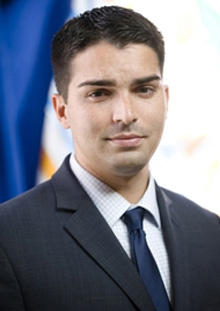This afternoon, the City Council's transportation committee held a hearing on resolutions asking Albany to move forward on two street safety initiatives: legislation allowing New York City to start a speed camera demonstration program, and a bill to close a loophole in the state's careless driving law. Votes on the resolutions are expected at the full City Council meeting on Wednesday.

Most of the hearing today was consumed by heated rhetoric about speed cameras.
Two camps became instantly clear. On one side are council members who support automated enforcement, led by Jimmy Van Bramer of Queens and committee chair James Vacca of the Bronx, who had the backing of advocates including Transportation Alternatives and Tri-State Transportation Campaign. On the other side sat the considerably noisier opposition, led by council members Dan Halloran and Eric Ulrich, both of Queens, backed by AAA New York and related lobbyists.
Ulrich, in particular, used the hearing to dismiss the dangers of speeding, saying that people who drive 10 to 15 mph over the limit (that would be up to 45 mph on local NYC streets) "pose no threat to anybody else on the road." In fact, the risk of killing a pedestrian skyrockets as vehicle speeds escalate over 20 mph, and speeding was a factor in 81 fatal crashes on NYC streets last year.
After stating that speeding is no big deal, Ulrich attacked the safety record of speed cams. "These are not proven to improve safety. The statistics are bogus. The numbers are fudged," he claimed. Then Ulrich joined AAA in casting doubts on the city's implementation of automated enforcement. "I don't believe them, and I don't trust them," he said of NYC DOT.
Ulrich and Halloran, like the police union and State Senator Marty Golden, say that the city should hire more officers for traffic enforcement instead of pursuing an automated enforcement program, because cameras cannot determine if a driver is drunk or has a suspended license.
Vacca and Van Bramer pushed back. "I am supporting this legislation," Vacca said, "because these cameras can be another weapon in our arsenal."
"It is not an either-or approach," Van Bramer said. "It's been done successfully in over 100 large cities across the country. There's no reason to believe it can't be done on the streets of New York City."
There was less opposition to the other measure on the agenda today -- allowing police to issue careless driving citations without personally witnessing the collision. Vacca noted at the beginning of the hearing that the two bills share a common denominator: allowing civil penalties to be issued without the presence of a law enforcement officer at the time of the infraction.
Halloran observed that under the current version of the careless driving statute, called Hayley and Diego's Law, officers responding to a crash could choose to have witnesses sign affidavits if the officer himself did not witness the collision, but that the NYPD refuses to do this. "I don't have any issue with the state legislature revisiting and making explicit the authority," Halloran said, calling the loophole closure "long overdue."
The Senate transportation committee will hold a hearing on the Hayley and Diego's Law loophole tomorrow.





